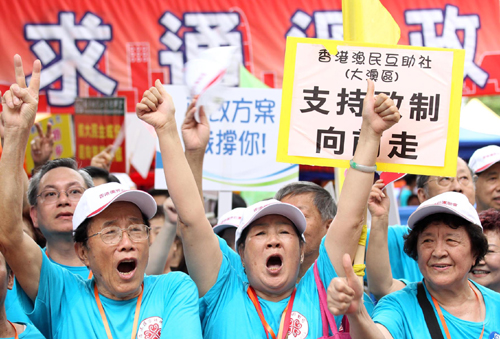-
News >China
Hong Kong passes chief election reform
2010-06-25 06:37Hong Kong - Lawmakers passed reforms that weeks ago seemed certain to fail, expanding Hong Kong's Electoral Committee membership. The measure passed by a 46 to 13 vote Thursday.

Supporters celebrate outside the Legislative Council in Hong Kong on Thursday after legislative councilors vote in favor of reform proposals for the 2012 election of the chief executive. [China Daily]
The bill reforms the system by which Hong Kong's chief executive will be chosen in the 2012 elections. It stipulates the membership of the Election Committee (EC) that chooses the chief executive will increase from 800 to 1,200. In addition, every one of the four sectors of the EC will also increase by 100 members.
The EC's members are individuals and special interest sectors, such as finance, information technology, and wholesale and retail, known as functional constituencies.The proposal, which required a two-thirds majority of the Legislative Council's 60 members, passed with the support of pro-government legislators, plus eight crucial votes from the opposition Democratic Party (DP).
Legislation to accommodate the change in the election law will be ready by October.
As debate on the bill resumed on Thursday morning, the reform's supporters and opponents continued to rally outside the buildings where legislators were deliberating.
However, the size of the rallies was much smaller than Wednesday night's turnout for the debate's start. Members of the so-called "post-1980's generation" were especially tough on the DP, demanding members justify their support for the compromise proposal that assured the reforms' passage.
Secretary of Justice Wong Yan-lung defended the DP in his submission on behalf of the government. He brushed aside accusations the opposition party had violated the principle of "One Country, Two Systems" when it consulted with the central government's liaison office.
The DP communicated with the central government to break a crippling deadlock on reform, he said. He added that he believed most citizens would be happy that an accord had been worked out.
Wong said it would be unfair to accuse DP members of losing their integrity and breaking their election pledges.
DP lawmaker Lee Wing-tat said the return of the five new functional constituency seats by 3.2 million voters is by no means a small step. He spoke of the compromise his party had proposed as the means to a de facto direct election.
Lee also said the proposal enhances the democratic process of the election of lawmakers. He rejected charges that the DP's shift in position amounted to a betrayal of its principles.
Party colleague James To, who objected to the compromise, became the focus of media attention after party colleague Andrew Cheng quit the DP on Wednesday night.
Cheng characterized the accord between the DP and the government as unacceptable. He said voting in favor of the proposal would violate the election pledge he made in 2008.
"The compromise agreement will weaken the will of the people to strive for universal suffrage," he said.
To said he would not follow Cheng through the exit door. Outside the chamber, he said he would follow the party line, cast a "yes" vote and persuade founding chairman Martin Lee not to quit the party.
Paul Chan, who represents the accounting constituency, supported the reform, saying he wanted constitutional development to move forward. If the reform was vetoed again, there would be a further disintegration of Hong Kong society, and chaos would ensue, he said.
The Civic Party and the League of Social Democrats (LSD) formed the hardcore opposition to the reforms. Both parties said the reforms did not provide a solid roadmap to universal suffrage and the abolition of functional constituencies. The DP broke its election pledge and betrayed the democratic process, LSD legislator and political pundit Raymond Wong said.
The method for selecting the chief executive will take effect after receiving the consent of Chief Executive Donald Tsang and being reported to the Standing Committee of the National People's Congress for approval.
Following the vote, debate began on proposals for Legislative Council members' 2012 election.
